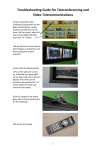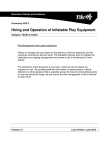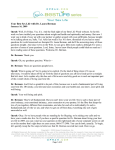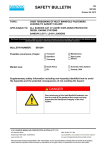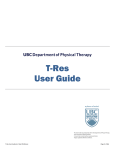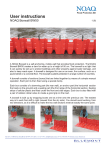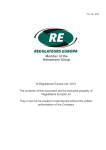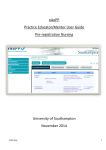Download User Guide - University of Tasmania
Transcript
Simulated Learning Environments (SLEs) Burnie / Mersey Campus’ Rural Clinical School User Guide Version 4.0 This User Guide has been developed to assist clinicians with teaching in the RCS Simulated Learning Environments. In conjunction with an Orientation Session it will provide you with some useful resources to help with organising your teaching sessions. It is not an exhaustive list so please feel encouraged to seek out other resources and share them with your colleagues. University of Tasmania Rural Clinical School Updated: Thursday 9th July, 2014 Contents Page About the Simulated Learning Environments ………………..… 2 The RCS SLE Philosophy Aims of the SLEs RCS Simulated Learning Environment Staff ……………………… 3 Who Can Use the SLEs …………………………………………………..… 4 Equipment for Clinical Skills Teaching ……………………………… 5 Policies and Procedures ...……………………………………………….. 6 Accessing and Booking the SLEs Burnie Campus Mersey Campus …………………………………………………….. Telehealth Bookings DHHS Teaching in the SLEs Use of Equipment Consumables …………………………………………………………. Videotaping Infection Control & WHS Supporting/Related Documents /Procedures 7 8 Teaching and Learning resources .…………………………………… 9 Checklist for Developing Skills Sessions .…………………………. 10 Appendix 1 Simulated Learning Environments Booking Form …... 11 Appendix 2 SLE Terms and Conditions of Hire …………………….….… 13 Appendix 3 SLE Zoonosis Procedure …………….………………….…...… 14 About the Simulated Learning Environments (SLEs) The Rural Clinical School‟s (RCS) Simulated Learning Environments (SLEs) at both Burnie North West Regional Hospitals Campus and the Mersey Community Hospital have been developed to provide a multidisciplinary centre of partnership and excellence in rural clinical education and development. The RCS provides a regional facility that promotes and advances health education and research across interprofessional curriculums. The RCS SLE Philosophy: Aims of the SLEs: To be drivers for patient safety; Provide a regional facility for interprofessional learning and teaching; Reflect and support hospital and community policy and procedures in practice; and Promote practice in teaching and learning in simulation. The SLE‟s are equipped with state of the art manikins and part task trainers that allow health professionals to simulate a range of situations similar to real life clinical practice 2 RCS Simulated Learning Environment Staff The RCS employs several staff who oversee the organizational, educational and strategic direction of the Centre‟s. These include a Manager, Simulation Educator/s and Administration and Technical support. Simulated Learning Environment Team Leader Dr Nick Towle [email protected] RCS Burnie: 229 (level 1) 6430 5931 Clinical Simulation Educator/s Mrs Lynn Greives [email protected] RCS Burnie: 217 (level 2) 6430 4550 Mrs Heather Bryer [email protected] RCS Burnie: 104A (level 1) 6430 4563 Clinical Medical Educator Mrs Luanne Steven [email protected] RCS Burnie: 255B (level 2) 6430 5915 RCS Latrobe: 2C16 (level 2) 6430 1608 SLE Academic AO Ms Melissa White [email protected] RCS Burnie: 104A (level 1) 6430 4551 3 Who can use the SLE‟s? The SLE‟s can be accessed by individual or group health professionals and undergraduates on the North West coast. Out of hours bookings require security arrangements to be made for your access. Bookings can be made through the Rural Clinical School‟s website using the SLE Online Booking Form at http://www.utas.edu.au/rural-clinical-school/about-the-rcs/facilities/rcs-burnie/sle-booking-request-form Please contact the SLE Team if you would like any additional information by email: [email protected] or by phone: (03) 6430 4550. Clinical Teaching Staff may be available to assist with clinical teaching and learning needs in a group or one on one basis. Key User groups: Year 4 and Year 5 MBBS Medical students Medical practitioners Nursing students Postgraduate nurses Allied health professionals; and Paramedics and First Responder Teams 4 Equipment for Clinical Skills Teaching The SLE‟s house a vast range of equipment to meet the learning needs of health professionals for simulated learning. The equipment has been purchased and developed based on consultation with practicing clinicians teaching in acute and primary care settings. Along with a range of suitable consumables the following equipment is available for use: 3G SimMan ALS manikins BLS manikins IV arms and epidermis pads Defibrillators/ECG monitor Male /female catheterisation model Resusci Anne CPRD Skills trainer Basic and advanced airway equipment X-ray viewers Birthing simulator Female pelvic structure and baby with placenta Paediatric airway equipment (manikins & part task trainers) Lung sounds simulator Lumber puncture trainer Arterial wrist pad task trainer Pelvic model with ovaries, cervix and uterus options (& consumables for vaginal examination) Suture Pads ALS Manikin and Monitor Paediatric Manikin Instructions for maintenance and use of equipment can be found in the Equipment Manual in the SLE‟s. SLE staff can be consulted to explain the most efficient and effective use of equipment and some handy hints on how to use equipment for teaching and learning. 5 Policies and Procedures The following policies and procedures govern the access and use of the SLE‟s. These are extracted from the RCS Policy and Procedure Guidelines and must be adhered to by all teachers/session leaders accessing the SLE‟s. Accessing and Booking the SLE’s The SLE‟s are restricted area of access. High levels of security are maintained to ensure the integrity of teaching spaces, equipment and confidential information. Rooms must be booked in advance via the Rural Clinical School‟s website using the SLE Online Booking Form at http://www.utas.edu.au/rural-clinical-school/about-the-rcs/facilities/rcs-burnie/sle-booking-request-form. If you require any additional information about our facilities and/or equipment, please contact the SLE Team if you would like any additional information by email: [email protected] or by phone: (03) 6430 4550. Confirmation of the booking will be made once the SLE staff have reviewed the submitted SLE Online Booking Form which includes details relating to the sessions being taught, related learning objectives, equipment required and number of students and facilitators that will be in the Centre. Access to the booked area can be gained by signing out a swipe card from RCS Reception during business hours. Burnie Campus: North West Regional Hospitals Campus Consists of several practical training areas: 1. The High Fidelity Suite (SLE A) – this area houses interactive paediatric and adult human patient simulators, with an adjacent control room from which simulators are operated. This area can only be booked by external users following consultation with high fidelity staff. RCS staff must be available to assist with training requested to be undertaken in this area. 2. Skills Training Room (Skills C) - this area is suitable for small group training of clinical skills, including BLS, ELS & ALS programs. In addition audiovisual facilities are available making this a useful space for small group tutorials. Please note that although there are gas outlets located on the wall in this area, a gas supply is not connected. 3. Consult Rooms (Consult 1, 2 and 3) – Consult Rooms 1 and 2 have been re-designed in 2012, allowing both high-fidelity and clinical skills to be taught in these rooms. They are both large rooms, ideal for approximately 10 -12 participants. Consult 3 is loosely designed around General Practice consulting rooms that may be utilised as training rooms. Also included in this room is a TeleHealth Video Conferencing unit which may be booked using the Rural Clinical School Booking process. Please contact RSC Reception for further information on (03) 6430 4550 6 Latrobe Campus: Mersey Community Hospital Consists of two practical areas: 1. Skills Lab 1 & 2 - these areas are designed to simulate clinical practice areas and have been equipped with oxygen and suction supplies along with other acute care amenities. These are suitable for small group training of clinical skills, including BLS, ELS & ALS programs. Skills Lab A is equipped with a computer. All users of the SLE‟s are required to undertake an Orientation to the areas before teaching. It will be the responsibility of the clinical teacher to make a time with SLE staff for this to take place. Telehealth Bookings - DHHS When you have made your room booking, if you require a videoconference with DHHS sites bookings can be made by contacting; Telehealth telephone 1300 334 588 Or email [email protected] Teaching in the Centre All teaching sessions require Learning Objectives as outlined in the SLE Online Booking Form Facilitators will be expected to be familiar with procedures governing set up of the SLE for teaching, use of equipment, cleaning of equipment and maintenance of teaching spaces in the SLE and reflect policies of the user groups governing authority. Facilitators will be required to negotiate requirements for teaching sessions with SLE Staff prior to the event to ensure appropriate resources are available. Consumable resources will need to be provided by user groups. It is recommended that procedures being taught in the SLE be aligned with guidelines in the Area Health Service Procedures Manual. One facilitator is required for every six to eight participants during training sessions. Use of Equipment All equipment is to be cleaned following use and packed away accordingly. Guidelines are provided in the „Equipment Cleaning Instructions‟ folder located within the SLE Office. Damage to equipment must be reported to SLE Staff immediately. Equipment may be borrowed for use outside the SLEs, once the SLE Online Booking Form has been completed and approval granted by the SLE staff. 7 Consumables Please note that you are responsible for providing any consumables that may be required for your session. These include supplies such as urinary catheters, dressing packs, cannulae, syringes and dressings. Attendance Lists It is a UTAS WHS policy that attendance lists are recorded for each session held in the SLEs. The RCS has available a RCS SLE attendance sheet, which is located within each of the rooms on the wall. Videotaping and Photography Videotaping and photography must follow UTAS policy and include clearly stated learning objectives, preparation of role players, debriefing and maintenance of confidentiality. All participants and teachers are required to complete the relevant Media Release Forms relating to confidentiality and integrity of teaching process. All videotaped information will be kept secure in the SLE‟s through the Video Debrief system. Access to this information will require a request to the Centre Manager. Infection Control & WH&S Users of the Centres should be familiar with the North West Regional Hospital (NWRH) Infection Control Manual. Any injury occurring in the SLE‟s needs to be reported immediately to: RCS School Administration Manager: Danielle Kidd – (03) 6430 4565 / [email protected] and/or RCS Health and Safety Officer: Mel White – (03) 64304551 / [email protected] This will ensure appropriate processes will be followed according to the UTAS WH&S guidelines. Code of Conduct No food or drink is to be taken into the SLE‟s. It is recommended that valuables be locked away in a secure space outside the SLE‟s. Bags and clothing must not be placed on the floor in the SLE‟s. Closed in footwear should be worn at all times in the SLE‟s. The use of mobile phones should be switched off unless required for emergency contact. 8 Teaching and Learning Resources There are a number of articles relating to the philosophy and practice of simulation teaching and learning which may be useful to read. Other resources relevant to developing teaching sessions are available in hard copy and on line. Internal users may refer to the Teaching and Learning Resources for Clinicians on the RCS N: Drive. The following Flow Chart (Process for Developing Skills Sessions) can be used to assist with organising the administrative requirements of teaching sessions in the SLE‟s. The SLE Staff may be available to assist you with this process if required. Supporting/Related Documents/Procedures The following documents are available electronically or in the SLE‟s to assist with teaching and learning. Document Location NWRH – Nursing Procedure Manual SLE‟s NWRH – Equipment Cleaning Manual SLE‟s Simulation Equipment Manuals SLE‟s RCS SLE‟S User Guide (4.0) On line/SLE‟s Participant Confidentiality Form On line/SLE‟s Request for use of videotaped information Online/SLE‟s 9 Checklist for Developing a Skills Session RCS Simulated Learning Environments (SLE’s) 10 Rural Clinical School, SLE Online Booking Form http://www.utas.edu.au/rural-clinical-school/about-the-rcs/facilities/rcs-burnie/sle-booking-request-form 11 SLE Online Booking Form, as of 04/07/2014 12 SLE Terms and Conditions of Hire. http://www.utas.edu.au/rural-clinical-school/about-the-rcs/facilities/skills-centres/tabs/conditions-and-termsof-hire 1. Conditions of Agreement The term „hirer‟ will include the applicants organisation. The University of Tasmania (UTAS) agrees to hire the Hirer the venue/s together with equipment in accordance with the Terms and Conditions of Hire of the Rural Clinical School (RCS) facilities and any attached additional documents. The Hirer agrees to be bound by these Terms & Conditions and by any additional conditions which the University may notify to the Hirer prior to the commencement of hire. 2. Responsible Officer Unless agreed to the contrary in writing, the Hirer must nominate an attendant who is aged 18 years or more and who will be present for the duration of the function and who will take responsibility for ensuring compliance with statutory safety requirement and the Terms and Conditions of Hire. 3. Charges and Deposits There is currently no charge for hire of RCS rooms and facilities. However a fee may be applied if rooms are not left in an “as found” condition. 4. Cancellations The RCS has the right to not accept a booking or to cancel at any time. The Hirer shall notify the Rural Clinical School of cancellations not less than two working days prior to commencement of hire. 5. Indemnity The Hirer shall indemnify and keep indemnified UTAS against all losses, expenses, liabilities, claims and damages incurred as a result of, or arising out of, the hiring of the premises, whether caused by any act of omission of the Hirer, its servants, agents or invitees, or any other person. 6. Insurance External Hirers and users of the University venues must be covered by public liability insurance. The Hirer must provide evidence of a current public liability insurance policy for no less than $10 million. 7. Duty of Care and Infection Control The Hirer should be conversant with the RCS Emergency and Evacuation Procedures displayed in all areas of the RCS and supplied when the booking if confirmed. The Hirer should ensure that all members of the group are aware of the procedures. The Hirer is responsible for leaving the premises clean and tidy at the conclusion of the period of hire. The RCS may carry out, at the expense of the Hirer, such cleaning or other works as may be required to restore the premises to a satisfactory condition. Excepting fair wear and tear, the Hirer shall be liable to the RCS for any damage to premises or to any fittings, equipment, furniture, carpets or other property therein, which occurs during the period of hire. The Hirer must immediately notify Security of any damage or loss on (03) 6324 3336. At the end of each session the Hirer is responsible for switching off all lights, turning off appliances such as urns and closing all doors. 8. Zoonoses & Animal Based Hazards Use of animal body parts for training should be advised in advance (acknowledging that some individuals may have cultural or ethical reasons for not wishing to participate in this aspect of the training). The source for the parts cannot be experimental animals or animals killed specifically for the purpose of clinical training. Universal precautions should be maintained at all times and an agreed clean-up and disposal plan should be discussed with the Simulated Learning Environment (SLE) staff and is the responsibility of those bringing the materials to the SLE. Please refer to the UTAS Infection Control Procedure 9. Orientation Process and OH&S All users of the SLE are required to undertake an Orientation to the Centre before teaching. It will be the responsibility of the clinical teacher to make a time with SLE staff for this to take place. Users must also be familiar with the SLE User Guide. The Hirer must adhere to the SLE workplace health and safety guidelines. The Responsible Officer is responsible for completing an attendance sheet of all participants, as part of RCS WH&S requirements. 10. Publicity The Hirer shall not issue any advance publicity of the use of the premises before receiving written acceptance of the booking by the RCS. The Hirer shall not make any statement in any advertisement which directly or indirectly applies that the event for which the premises are hired is conducted or promoted by UTAS. The Hirer shall not issue any tickets, posters, advertisements, programs and other literature containing any UTAS logo unless the printer‟s or other proof thereof has been approved in writing. The Hirer shall not display any poster or advertisement in any part of the premises or grounds of the RCS without have first obtained written permission. 11. Good Order The Hirer shall be responsible for the maintenance of good order in and around the premises during the period for which the premises are hired. The Hirer shall comply with any instruction by a University Security Officer or any officer of UTAS relating to the maintenance of good order and compliance with these Terms and Conditions in and around the premises. 12. Disputes Any disputes between the Hirer and UTAS arising from, or in relation to, any hiring of the premises or from the terms of Conditions of Hire, shall be submitted to arbitration by a person appointed by the Vice Chancellor of the University, and the decision of the arbitrator shall be binding on the Hirer and the University. 13. Room Allocations and Relocation The RCS reserves the right to relocate a booking to a suitable venue if circumstances demand. Teaching requirements and official RCS events take precedence over external booking requirements. During teaching semesters, teaching areas are allocated accordingly to the following priority: 1) Medical Students, 2) Nursing Students, 3) Allied Health Students 4) Other Health Professional Groups. 14. Teaching in the Centre All teaching session in the Centre are required to outline Learning Objectives in Section B as above. Teachers are required to negotiate requirements for teaching sessions with the Clinical Skills Educator prior to the event to ensure resources are available. 15. Use of Equipment All equipment is to be cleaned as per procedure manual and packed away accordingly following usage. Damage to equipment must be reported to SLE Staff immediately. 13 14















